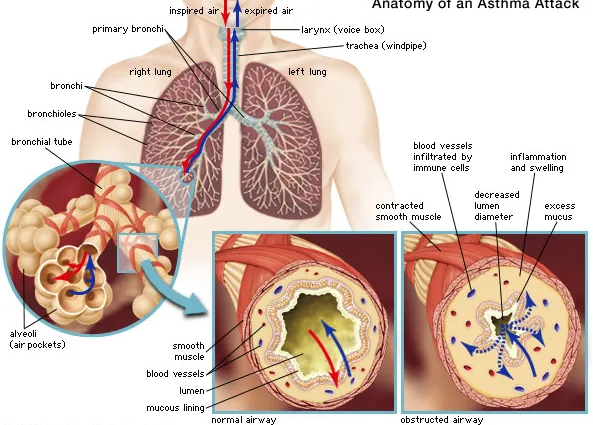
ABSTRACT:
In this article, we will discuss about the molecular and genetic basis of respiratory diseases. These diseases are related to respiratory system and causes by several factors. Several factors such as smoking, pollen allergy, alcohol drinking, pulmonary infection etc. We will also provide references to learn and acknowledge the molecular and genetic basis of respiratory diseases.
INTRODUCTION-GENETIC BASIS OF RESPIRATORY DISEASES:
Respiratory diseases are a broad category of disorders affecting the airways, lungs, and respiratory system. From chronic conditions like asthma and chronic obstructive pulmonary disease (COPD) to infectious diseases such as pneumonia and tuberculosis, understanding the molecular and genetic underpinnings of these ailments is crucial for developing effective treatments and preventive measures. In this article, we delve into the intricate interplay of genetics and molecular mechanisms in respiratory diseases, shedding light on key insights and recent advancements in the field.
MOLECULAR AND GENETIC BASIS OF RESPIRATORY DISEASES:
1. GENETIC BASIS OF RESPIRATORY DISEASES:
Genetic predisposition is an important factor in the development and progression of numerous respiratory disorders. Asthma, a chronic inflammatory condition of the airways, has related to hereditary differences in genes that encode proteins involved in immune control and airway inflammation. Studies have found links between asthma susceptibility and polymorphisms in genes such as ADRB2 (beta-2 adrenergic receptor) and IL-4 (interleukin-4). It regulate airway smooth muscle function and immunological responses, respectively. Similarly, genetic factors impact COPD, which is defined by airflow restriction and persistent airway inflammation. Variants in genes encoding enzymes involved in the detoxification of cigarette smoke components, such as glutathione S-transferases (GST), have been linked to COPD risk. Furthermore, mutations in the alpha-1 antitrypsin (SERPINA1) gene can cause alpha-1 antitrypsin deficiency. It is a genetic risk factor for early-onset COPD and emphysema.

2. MOLECULAR BASIS OF RESPIRATORY DISEASES:
At the molecular level, respiratory disorders are caused by intricate interactions between environmental influences, cellular pathways, and genetic predisposition. In asthma, exposure to allergens or irritants causes an inflammatory response that includes the production of cytokines, chemokines, and reactive oxygen species. These inflammatory mediators attract immune cells such as eosinophils and mast cells to the airways, resulting in bronchoconstriction and airway remodeling. Cigarette smoke inhalation is a major environmental risk factor in COPD, triggering a series of molecular processes such as oxidative stress, inflammation, and protease-antiprotease imbalance. Cigarette smoke includes hazardous chemicals that trigger inflammatory pathways in lung epithelial cells and alveolar macrophages, leading to the production of pro-inflammatory cytokines such as IL-8 and TNF-α. Chronic inflammation causes lung tissue damage and reduces pulmonary function over time, leading to COPD etiology.

3. THERAPEUTIC IMPLICATIONS-GENETIC BASIS OF RESPIRATORY DISEASES:
Understanding the molecular and genetic underpinnings of respiratory disorders holds potential for developing targeted treatments and individualized treatment strategies. Advances in genomics and molecular biology have opened the path for precision medicine tactics that target particular genetic markers and molecular fingerprints linked to disease susceptibility and progression. Pharmacogenomic research, for example, have looked at how genetic variants affect individual reactions to asthma drugs like beta-agonists and corticosteroids. Healthcare practitioners can improve therapeutic results and reduce side effects by customizing treatment regimens to patients’ genetic profiles.
CONCLUSION:
In conclusion, understanding the molecular and genetic intricacies of respiratory disorders is a critical component of current biomedical research. Scientists and doctors can create creative ways for diagnosis, prevention, and therapy by unraveling the underlying processes that cause these disorders, thereby improving the lives of millions of people worldwide who suffer from respiratory illnesses. Furthermore, developing treatment methods such as gene therapy and gene editing technologies provide innovative approaches to tackling respiratory illnesses at the molecular level. Clinical trials looking at the use of gene-based therapy for illnesses such as cystic fibrosis and alpha-1 antitrypsin deficiency have yielded encouraging findings, highlighting the promise of genetic techniques in respiratory medicine.
REFERENCES:
Ober C, Yao T-C. The genetics of asthma and allergic disease: a 21st century perspective. Immunological reviews. 2011;242(1):10-30. https://pubmed.ncbi.nlm.nih.gov/21682736/
Vogelmeier CF, Criner GJ, Martinez FJ, Anzueto A, Barnes PJ, Bourbeau J, et al. Global strategy for the diagnosis, management, and prevention of chronic obstructive lung disease 2017 report: GOLD executive summary. European Respiratory Journal. 2017;49(3):1700214. https://pubmed.ncbi.nlm.nih.gov/28182564/
Cho MH, McDonald M-LN, Zhou X, Mattheisen M, Castaldi PJ, Hersh CP, et al. Risk loci for chronic obstructive pulmonary disease: a genome-wide association study and meta-analysis. The Lancet Respiratory Medicine. 2014;2(3):214-25. https://pubmed.ncbi.nlm.nih.gov/24621683/




